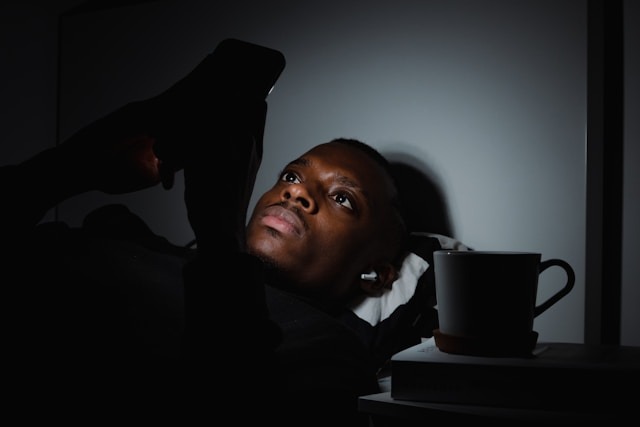By Alphayem Health Desk | Updated: October 2025
Why Many People Can’t Drop Their Phones at Night
For many Nigerians, the last thing they touch before sleeping is not a pillow — it’s their phone. Whether it’s replying to WhatsApp chats, scrolling through X (Twitter), checking Facebook updates, or watching TikTok videos, mobile screens have become our bedtime companions.
While this habit feels comforting, it’s one of the leading causes of poor sleep quality among youths and adults. Experts have warned that the constant use of phones before bedtime affects not only how fast you fall asleep but also the quality of your rest and your overall mental wellbeing.
In this post, we’ll explore the real dangers of using phones before bed, why it’s harmful, and what healthy habits you can adopt instead.
1. Blue Light Interferes with Sleep Hormones
The screens of smartphones emit a type of light called blue light. This light tricks your brain into believing it’s still daytime, which disrupts the natural production of melatonin — the hormone responsible for making you feel sleepy.
When melatonin levels are low, your body stays alert instead of winding down. This explains why you can spend hours scrolling online yet struggle to sleep afterward. Over time, irregular sleep patterns can lead to insomnia, fatigue, memory loss, and irritability.
A study published by Harvard researchers found that people exposed to blue light before bedtime took longer to fall asleep and felt sleepier the next morning compared to those who avoided it.
2. Eye Strain and Blurred Vision
Many people love using their phones in dark rooms, especially during power outages or late at night when the environment is quiet. But staring at a bright screen in a dark room puts tremendous pressure on your eyes, causing eye strain and dryness.
The symptoms often include headaches, blurred vision, and sometimes watery or itchy eyes. This condition, called digital eye strain, is becoming very common among students, office workers, and even secondary school learners.
In extreme cases, long-term exposure may worsen eyesight problems or make you more dependent on glasses earlier than expected.
3. Increased Anxiety and Restlessness
The type of content you consume before bed can also affect your mental health. Reading sad news, replying to stressful messages, or watching emotional videos can raise your stress levels just before sleep.
This mental stimulation keeps your brain active and alert, making it hard to relax. Psychologists describe this as “pre-sleep anxiety” — when your mind can’t calm down because it’s still processing the last information you saw on your screen.
Constantly exposing yourself to digital stress before bed may increase your risk of anxiety disorders and depression over time.
4. Poor Academic and Work Performance
When you stay up late watching videos or chatting, you’re sacrificing sleep — and this has direct consequences on your daily performance. For students, it means lower concentration, poor memory retention, and less motivation to study.
For workers, it can lead to lateness, fatigue, and lower productivity. Many Nigerian teachers and employers complain that young people often come to class or work tired because they were “online all night.”
Good sleep improves creativity, focus, and decision-making. Losing it to late-night phone use has the opposite effect.
5. Weight Gain and Hormonal Imbalance
Lack of quality sleep affects your metabolism — the way your body processes energy. Studies show that insufficient rest can increase your appetite, especially for junk food, and slow down fat burning.
This happens because poor sleep interferes with two key hormones: ghrelin (which makes you hungry) and leptin (which signals fullness). When you sleep late, your body produces more ghrelin and less leptin, causing overeating and possible weight gain.
In Nigeria, where many youths already live sedentary lifestyles due to phone addiction, this combination worsens the risk of obesity and diabetes.
6. Relationship and Emotional Impact
Using your phone till midnight not only affects your health but also your relationships. Some couples complain that their partners pay more attention to their phones than to them during bedtime.
This constant distraction can reduce intimacy, emotional connection, and communication — slowly damaging trust in relationships.
7. How to Break the Habit
Breaking the habit of using your phone before bed may seem difficult, but it’s possible with gradual steps:
- Set a phone curfew — stop using your device at least 30 to 60 minutes before sleep.
- Use the “Night Mode” or “Blue Light Filter” setting on your phone.
- Keep your phone away from your pillow — charge it across the room instead.
- Read a printed book or listen to calming music before bed.
- Establish a regular bedtime routine to train your brain for rest.
If you live in a noisy or light-polluted environment, consider using a sleep mask or earplugs for better rest.
When to Seek Medical Help
If you notice symptoms like chronic insomnia, frequent headaches, or daytime fatigue, it might be time to visit a healthcare professional. A doctor can check for sleep disorders or recommend lifestyle changes to help you recover.
You can also explore online resources like Healthline’s Sleep Deprivation Guide for more insight.
Conclusion
Your smartphone is a powerful tool, but it should not control your bedtime. Using your phone just before sleep may look harmless, but over time, it weakens your eyes, damages your sleep quality, affects your mood, and reduces productivity.
Try to build a healthier bedtime routine — put your phone aside, relax your mind, and let your body recharge naturally. Remember, better sleep today means better health tomorrow.
Internal Link: Read also: 10 Common Health Mistakes Young Nigerians Make
Outbound Link: Visit the World Health Organization Sleep Health Page for more information.

